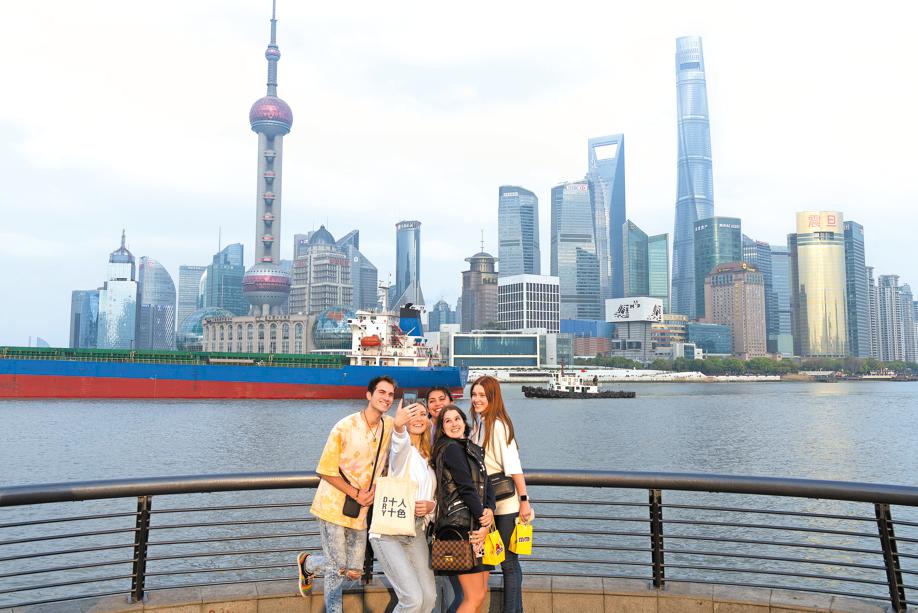China can open a new chapter for inbound tourism

Visitors to the Bund in Shanghai in April pose for a photograph, with the Pudong financial district in the background. WANG GANG/FOR CHINA DAILY
It has of late became easier for some foreigners to visit China. Under an experimental visa-free entry policy effective from Dec 1, 2023, to Nov 30, 2024, ordinary passport holders from France, Germany, Italy, the Netherlands, Spain and Malaysia are now entitled to visa-free travel to China for up to 15 days. The policy is widely expected to boost inbound tourism to China.
Inbound tourism has played a significant role in China's modernization thanks to the country's reform and opening-up. It helped China earn foreign exchange, accelerated the formation of a modern tourism system, improved service quality, promoted continued opening-up of the tourism sector and enhanced people-to-people exchanges between China and the world.
China's inbound tourism has also had a worldwide impact, and China registered more than 145 million inbound tourist trips in 2019.
The world now has greater expectations of China's inbound tourism. Foreign visitors don't only want to visit beautiful landscapes, but also to see from close quarters people's lives in both rural and urban areas. Their purpose of vising China is to understand the country and hear its voice.
Because of the bright prospects China offers, foreign markets want to communicate closely with their Chinese counterparts, discover unique products and services and develop sustainably with China's inbound tourism market.
Meanwhile, China expects inbound tourism to help advance the Global Civilization Initiative and shape the landscape of tourism cooperation across the globe. For example, inbound tourism, which is part of cultural exchange, can enhance friendship between peoples from China and the world, bolster the high-quality development and advance high-level opening-up. China's inbound tourism should be and must be a global public product.
Currently, China's inbound tourism and global tourism depend on each other. China needs to interact with the world to promote its inbound tourism with regard to the development environment, tourism convenience, marketing, unique tourism attraction and talent cultivation.
First, the tourism authorities should guide the development of an inbound tourism market, closely monitor tourism market change among China and major tourist destinations, adjust management policies of tourist groups and make efforts to attract tourists from countries involved in the Belt and Road Initiative.
Second, the relationship between inbound and domestic tourism should be handled properly. Inbound tourism needs to be integrated with the development of domestic tourism and social situations at the destinations. Tourists should get easy access to local infrastructure, public services, transportation and the internet. Also, their requirements and expectations should be met by market entities in order to promote the sustainable development of inbound tourism.
Third, related departments should cooperate to establish mechanisms to improve the convenience of getting visa and integrate resources to address problems concerning tickets.
What's more, tourism entities should create themes and models to connect foreign tourists with China, and create market products related to China's modernization to attract foreign tourists. For example, people's daily lives, enterprises' innovation and the products concerning the BRI are all sources of tourist attractions.
Efforts should be made to train tourism professionals, introduce talent, improve their abilities and provide incentives. Travel experts and enthusiasts can be included into the industry to adapt to the new business models.
All these moves can boost the high-quality development of inbound tourism. China's tourism market should develop to meet new demands for foreign visitors by promoting urban, culinary and health tourism. Besides, the integration between culture and tourism needs to be boosted to help tourists experience China's rich culture and history. The development of inbound tourism requires long-term efforts but it has a bright prospect.
(The author Yang Jinsong is director of the International Institute at the China Tourism Academy.)








